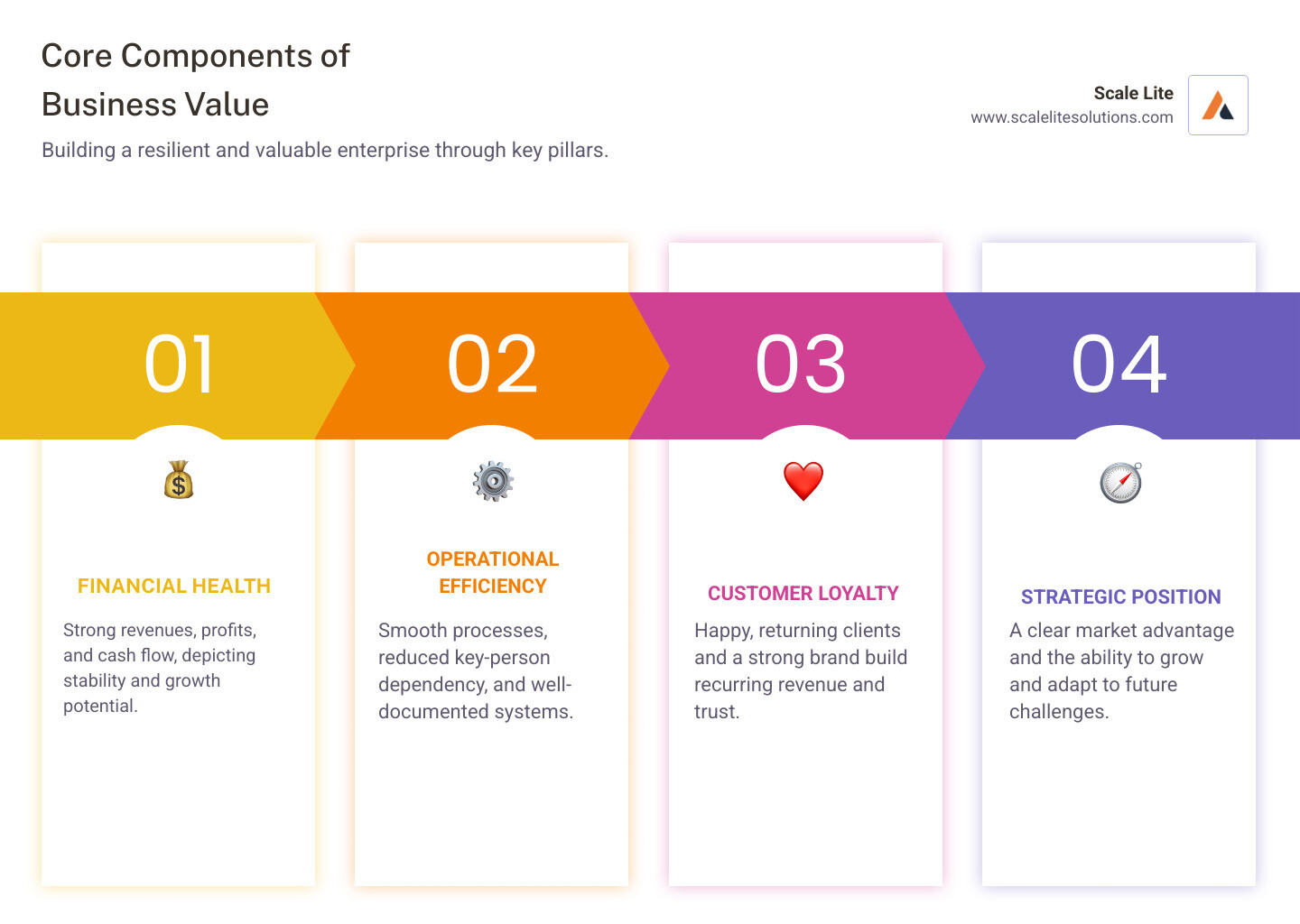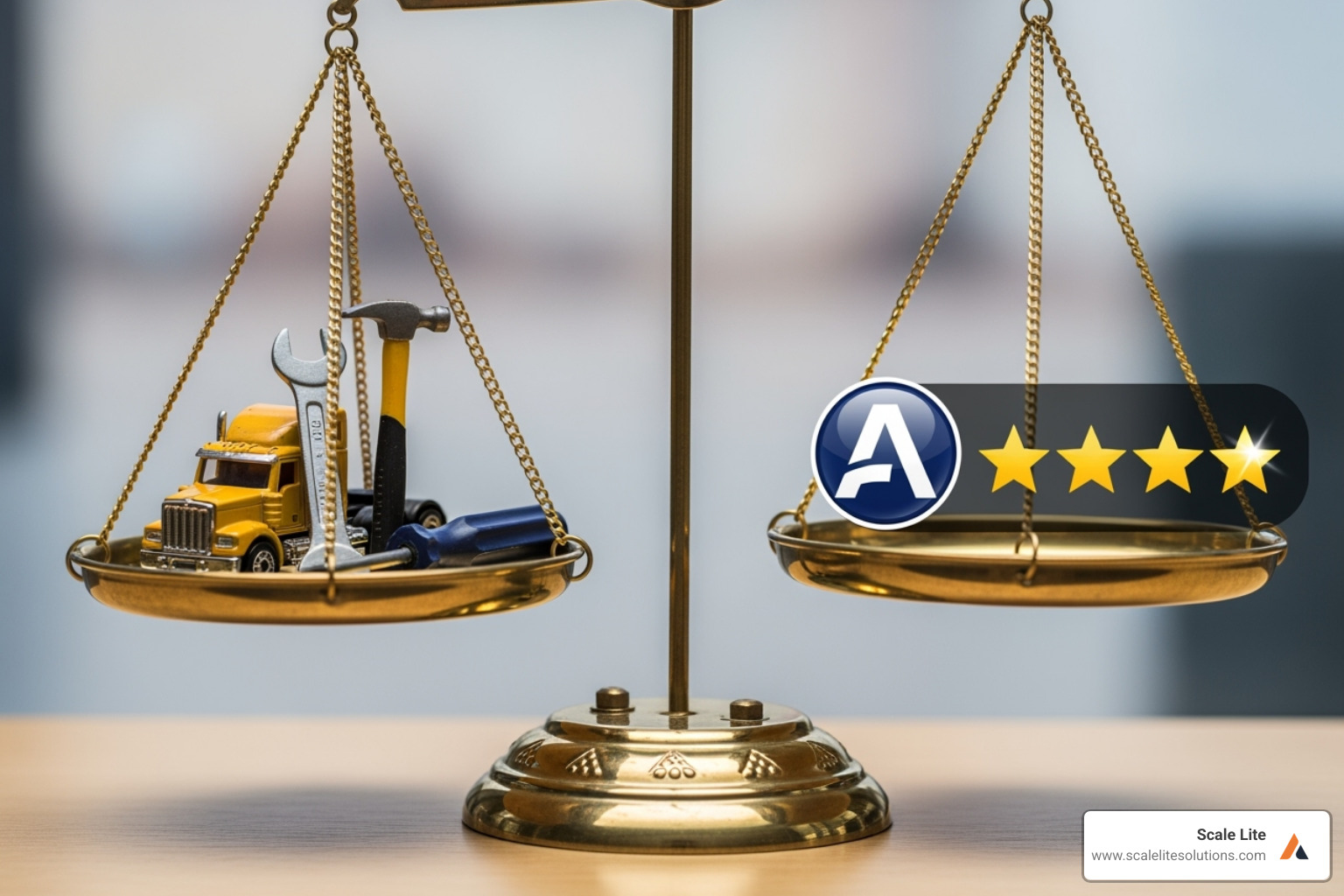
Value Up! Strategies for Boosting Your Business's Market Appeal

Open uping Your Business's Full Potential
As a business owner, you're dedicated to the daily grind of solving problems and keeping things moving. But what if all that hard work could build something even bigger and more sustainable?
Many owners feel stretched thin by manual processes and outdated tech, making growth feel uncertain or overly dependent on them. This guide is about making your business stronger, more efficient, and more valuable for the long haul—whether you plan to sell, pass it on, or simply run a smoother operation.
Business value improvement is the process of increasing your company's overall worth. This goes beyond just profits to include non-financial strengths like brand reputation, customer loyalty, and efficient systems. The goal is a more attractive and sustainable business for the future.
I'm Keaton Kay, founder of Scale Lite. My background in private equity and enterprise tech has shown me how to help service businesses achieve business value improvement by building robust, scalable systems. Let's explore how you can boost your business's market appeal.

Common Business value improvement vocab:
What is Business Value Improvement and Why Does It Matter?
Picture your thriving business. You solve problems and watch it grow. But business value improvement goes far beyond monthly profits. It's the strategic process of making your entire company more valuable by strengthening everything from cash flow to customer loyalty.
Business value includes tangible assets like equipment and cash, but the real drivers are often the intangible assets: your stellar reputation, loyal customers, team expertise, and the well-oiled processes that keep things running smoothly. A business focused on creating this holistic value is more resilient and less dependent on you personally.
This becomes critical if you ever consider selling. Most owners have a rosy view of their company's worth, but buyers look at cold, hard numbers. A business with $500,000 in annual profits (EBITDA) will typically be valued at 4 to 7 times that amount—between $2 million and $3.5 million. The gap between your emotional investment and the market's valuation can be jarring, but understanding it is the first step to bridging it.
To align your view with the market, focus on market-validated value drivers: consistent profit margins, a diversified customer base, and documented processes. These are the objective metrics that make buyers take notice. The best time to start is now, as building a strong brand or implementing robust systems doesn't happen overnight.

Nurturing your intangible assets is what transforms a good business into a great one—and makes the difference between an okay sale price and an exceptional one. For a deeper dive into value creation, see these 40 Examples of Business Value. To build lasting value, our guide on Business Growth Strategy is a great place to start, and a Business Exit Plan can help map out the journey.
The Core Pillars for Increasing Your Business's Value
To truly improve your business's value, we focus on three fundamental pillars that support and lift your entire enterprise.

Pillar 1: Fortify Your Financial Foundation
A strong financial foundation is the bedrock of a valuable business. We focus on key areas to present your company's best financial self:
- Profitability and EBITDA: We help boost your profit margins by scrutinizing expenses. EBITDA (Earnings Before Interest, Taxes, Depreciation, and Amortization) is a critical metric that gives a clear picture of operational profitability.
- Cash Flow and Debt: Healthy cash flow provides stability, while reducing excessive debt makes your business more attractive to buyers.
- Normalizing Financials: We identify "add-backs"—personal or discretionary expenses run through the business—to present a truer, often higher, picture of your company's operating income.
By benchmarking your Key Performance Indicators (KPIs) against industry norms using a Data-Driven Business Strategy, we can identify and address areas for improvement.
Pillar 2: Achieve Operational Excellence Through Systems and Technology
Many businesses operate on tribal knowledge, which leads to inefficiencies. Research by McKinsey indicates this can result in profit margins 5-10 percentage points lower than industry leaders. To achieve business value improvement, we focus on:
- Streamlining Processes: Implementing consistent systems reduces "fire-fighting" and moves you beyond time-draining manual tasks.
- Reducing Key-Person Dependency: A business that doesn't rely on a single individual is more stable and attractive to buyers. We help develop systems that ensure business continuity.
- Scalable Operations: We implement technology and automation so your business can handle growth without a proportional increase in costs.
We modernize operations with AI, workflow automation, and CRM optimization. This automates repetitive tasks, improves data accuracy, and boosts efficiency. For example, automation can ensure you respond to leads in minutes, dramatically increasing your chances of winning the job. Regularly updating operational manuals is also key to improving company valuation.
Learn more about changing your operations with How to Achieve Operational Excellence, Automation & AI, and Business Process Streamlining.
Pillar 3: Build Unshakeable Customer Loyalty and Brand Equity
Your customers and brand reputation are invaluable assets. We focus on:
- Customer Satisfaction & Perceived Value: When customers feel they receive high value, their loyalty increases. We help you improve this perception.
- Brand Reputation: A strong, positive brand builds trust, attracts new customers, and can command premium pricing.
- Recurring Revenue: Loyal, repeat customers create predictable income streams, which are highly valued.
A Gartner report highlights that when value improvements are easy for the customer, their likelihood of staying with the company is 61%. If it requires high effort, that chance plummets. The takeaway is to simplify processes and make it easy for customers to engage with you. This boosts satisfaction and retention, freeing up resources from customer acquisition.
Building a strong brand is a critical part of your Marketing for Business Growth strategy. For more details, refer to the Recent Gartner report.
Strategic Business Value Improvement: Planning for the Future
Business value improvement is a strategic, forward-thinking process. Like playing chess, every move should strengthen your long-term position. While many companies juggle multiple change initiatives, as noted by KPMG, the secret is to put value first. Every improvement should tie back to a measurable outcome that makes your business more valuable.
The Role of Innovation and Digital Change
Innovation for your business means embracing practical technologies that solve real problems. This could be using AI for predictive maintenance or implementing systems for automated invoicing. These changes are game-changers for business value improvement.
Workflow automation has the biggest impact, freeing up your team to focus on serving customers. With the right technology, data-driven decision making becomes possible, allowing you to move beyond guesswork. As McKinsey research shows, companies with strong innovative cultures are more likely to succeed in digital change. These innovations make your business more efficient and significantly more valuable to a potential buyer.
Explore our resources on Digital Change Strategies for Small Businesses and see how AI-Driven Workflow Automation can transform your operations.
When to Engage an External Advisor for Value Improvement
Being too close to your business can make it hard to see the full picture. An external advisor brings two key advantages: objectivity and specialized expertise. They offer a fresh, investor-focused perspective and have seen what works across many businesses.
While many owners seek help when preparing for a sale, the ideal time to engage an advisor is several years prior. This gives improvements time to take root and demonstrate consistent performance, which buyers value highly. The right partner can reduce owner fatigue by helping you build systems that make your life easier, ensuring you achieve your business value improvement goals.
Key Factors That Influence Your Business's Market Value
When a potential buyer looks at your company, they scrutinize it through a specific lens. Understanding what they prioritize is key to maximizing your market appeal and achieving true business value improvement. They look for a blend of solid numbers and qualitative strengths.
Key drivers include consistent financial performance, operational efficiency, a strong and diversified customer base, an experienced management team, and a clear competitive advantage. Strengthening these areas makes your business more resilient and valuable.
Financial Value Drivers Buyers Scrutinize
Buyers dig deep into your financials to understand the company's health and potential. They focus on:
- Historical and Projected Earnings: A track record of profitability and a believable roadmap for future growth.
- Profit Margins vs. Industry Benchmarks: How your margins compare to competitors. Lower margins can flag operational inefficiencies.
- Quality of Earnings: Sustainable profits, adjusted for any personal or one-time expenses to show the true operational picture.
- Recurring Revenue Streams: Predictable income from contracts or repeat service agreements, which signals stability.
- Customer Concentration: A diversified customer base is less risky than relying on a few large clients.
Non-Financial Value Drivers That Seal the Deal
Intangible qualities often give buyers the confidence to close a deal. These show your business is not just profitable, but also resilient and well-structured.
- Management Team Strength: A capable team that can run the business effectively post-sale.
- Documented Systems and Processes: Clear, written procedures prove you have a well-oiled machine, not a person-dependent operation.
- Brand Recognition and Reputation: A strong brand reduces customer acquisition costs and creates a barrier to competitors.
- Competitive Advantage: A unique service, niche market, or proprietary process that can't be easily replicated.
- Low Employee Turnover: This indicates a healthy, stable work environment, which is highly attractive to buyers.
Proactively creating Scalable Service Operations and working to Improve Business Operations will pay off significantly.
Frequently Asked Questions about Business Value Improvement
Here are answers to common questions about business value improvement.
How is business value different from profit?
Profit is a short-term snapshot of financial performance. Business value is a comprehensive measure of your company's total worth, including long-term potential. It encompasses not just profits and tangible assets (like equipment) but also crucial intangible assets like your brand reputation, customer loyalty, and operational efficiency. While profit is a component of value, business value represents the entire enterprise's worth to an investor or buyer.
How long does it take to significantly improve my business's value?
Meaningful business value improvement is a marathon, not a sprint. While some quick wins are possible, the most impactful strategies—like building a strong brand, implementing new systems, or diversifying your customer base—typically take 1 to 3 years to fully reflect in your company's valuation. It's a continuous process of strategic growth, so starting several years before a potential sale yields the best results.
Can I increase my business's value without planning to sell it?
Absolutely. The same strategies that make your business attractive to a buyer also make it more profitable, efficient, and enjoyable for you to run today. Focusing on business value improvement leads to higher profits, smoother operations with less owner stress, and a stronger competitive position. Whether you plan to sell or not, it's always a brilliant investment in your company's future.
Conclusion: Start Building a More Valuable Business Today
We've explored how business value improvement goes beyond just working harder. By strengthening your financial foundation, streamlining operations with smart systems, and building customer loyalty, you can transform your business into a more valuable and resilient enterprise.
This is a continuous process, not a one-time fix. Every improvement you make benefits you right now, whether you plan to sell or not. Technology, particularly AI and automation, has become a powerful lever for creating value, freeing you to focus on what matters most.
At Scale Lite Solutions, we take a holistic approach, combining technology, automation, and strategic planning to help you maximize your enterprise value. We believe that with the right partner, any business can achieve operational excellence and sustainable growth.
Your journey toward a more valuable business starts with a single step. Ready to see what's possible?
Learn How to Drive Business Growth and Explore how Automation & AI can transform your operations.
The future of your business is brighter than you might imagine. Let's build it together.







